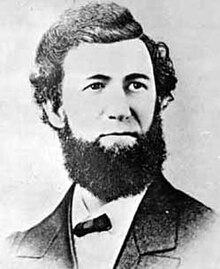Nelly Gray (song): Difference between revisions
→Lyrics: Removing deleted file |
removed link to a comment on an internet forum, specifically in a thread asking for suggestions as to “the saddest song ever written” |
||
| Line 4: | Line 4: | ||
"'''Darling Nelly Gray'''" is a 19th c. popular song composed by [[Benjamin Hanby]], and as such, is a pseudo-[[African-American]] [[folksong]]. Hanby composed the song while attending [[Otterbein College]] in [[Westerville, Ohio]] in 1856, in response to the plight of a runaway slave named Joseph Selby or Shelby. Benjamin Hanby's father, Bishop William Hanby, a [[Church of the United Brethren in Christ|United Brethren]] minister who was active in the [[Underground Railroad]], was attempting to raise money to free Selby’s beloved. Although author and origins of the song are known, and it may be seen in relation to the [[blackface]] genre, its documented folk transmission and variation suggest that it may be legitimately regarded as having passed into tradition. |
"'''Darling Nelly Gray'''" is a 19th c. popular song composed by [[Benjamin Hanby]], and as such, is a pseudo-[[African-American]] [[folksong]]. Hanby composed the song while attending [[Otterbein College]] in [[Westerville, Ohio]] in 1856, in response to the plight of a runaway slave named Joseph Selby or Shelby. Benjamin Hanby's father, Bishop William Hanby, a [[Church of the United Brethren in Christ|United Brethren]] minister who was active in the [[Underground Railroad]], was attempting to raise money to free Selby’s beloved. Although author and origins of the song are known, and it may be seen in relation to the [[blackface]] genre, its documented folk transmission and variation suggest that it may be legitimately regarded as having passed into tradition. |
||
In the song, a male slave in Kentucky mourns his beloved, who has been sold South to Georgia (where the slave’s life was conventionally regarded as yet more horrific). |
In the song, a male slave in Kentucky mourns his beloved, who has been sold South to Georgia (where the slave’s life was conventionally regarded as yet more horrific). |
||
Other titles include “Darlin’ Nelly Gray”, "Old Nelly Grey", “Oh My Darlin’ Nelly Gray”, “The Eumerella Shore (same melody)", and “Charming Nellie Ray”. |
Other titles include “Darlin’ Nelly Gray”, "Old Nelly Grey", “Oh My Darlin’ Nelly Gray”, “The Eumerella Shore (same melody)", and “Charming Nellie Ray”. |
||
Revision as of 16:18, 14 August 2012

- See Nellie Gray for the American pro-life activist
"Darling Nelly Gray" is a 19th c. popular song composed by Benjamin Hanby, and as such, is a pseudo-African-American folksong. Hanby composed the song while attending Otterbein College in Westerville, Ohio in 1856, in response to the plight of a runaway slave named Joseph Selby or Shelby. Benjamin Hanby's father, Bishop William Hanby, a United Brethren minister who was active in the Underground Railroad, was attempting to raise money to free Selby’s beloved. Although author and origins of the song are known, and it may be seen in relation to the blackface genre, its documented folk transmission and variation suggest that it may be legitimately regarded as having passed into tradition.
In the song, a male slave in Kentucky mourns his beloved, who has been sold South to Georgia (where the slave’s life was conventionally regarded as yet more horrific).
Other titles include “Darlin’ Nelly Gray”, "Old Nelly Grey", “Oh My Darlin’ Nelly Gray”, “The Eumerella Shore (same melody)", and “Charming Nellie Ray”.
Lyrics
As with all folksongs, there is considerable variation; one version runs thus:
In a long green, valley on the old Kentucky shore
Sure I've whiled many happy hours away,
Just a sitting and a singing by the little cabin door
Where lived my darling Nellie Gray
When the moon had climbed the mountain, and the stars were shining bright
I'd take my darling Nellie Gray
And we'd float down the river in my little red canoe
While my banjo so sweetly I would play
One night I went to see her, but she's gone the neighbors say
And the white man had bound her with his chain
They have taken her to Georgia for to wear her life away
As she toils in the cotton and the cane
Oh, my darling Nellie Gray, they have taken you away
I'll never see my darling anymore
They have taken you to Georgia for to work your life away
And you’re gone from that old Kentucky shore.
Now my canoe is under water, and my banjo is unstrung
I am tired of living, anymore
My eyes shall be cast downward, and my songs will be unsung
While I stay on the old Kentucky shore
Now my eyes are getting dimmer and I cannot see the light
Hark there’s someone a-knocking at my door
Oh I hear the angels coming and I see my Nellie Gray
So farewell to the old Kentucky shore
Oh, my darling Nellie Gray, up in heaven, so they say
And they'll never take you from me, anymore
Oh I'm coming, coming, coming, as the angels clear the way
So farewell to the old Kentucky shore
-
Darling Nelly Gray, page two
-
Darling Nelly Gray, page three
See also
External links
- Text and RealAudio for versions collected in the field by Max Hunter:


